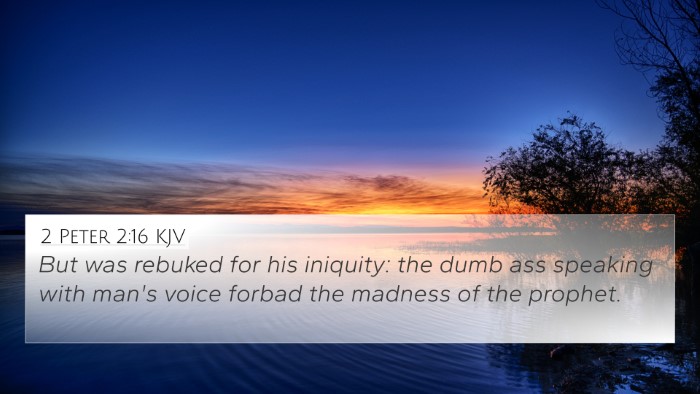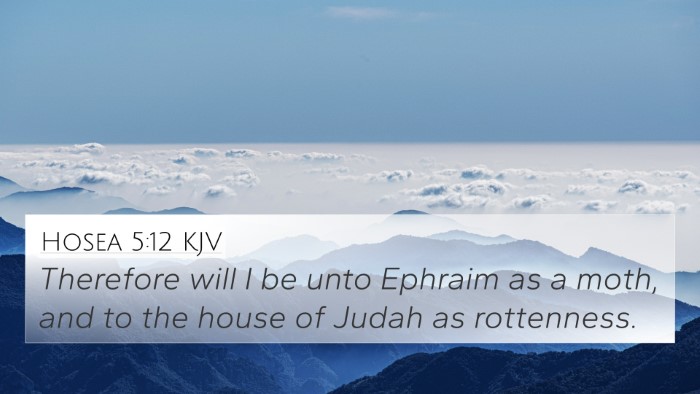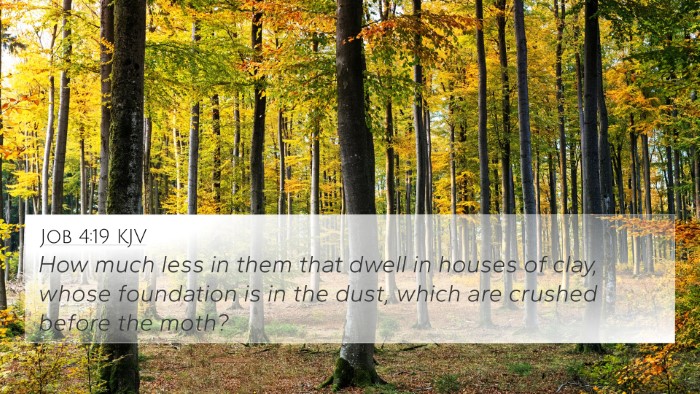Bible Verse Meaning of Psalms 39:11
Psalms 39:11 (KJV): "When thou with rebukes dost correct man for iniquity, thou makest his beauty to consume away like a moth: surely every man is vanity."
Summary of Psalms 39:11
This verse addresses the corrective nature of God's rebuke and its impact on human life and beauty. It illustrates the fleeting nature of human existence and the vanity that often accompanies it. The psalmist reflects on the frailty of life, emphasizing that correction from God is essential for spiritual growth, even though it may be painful.
Commentary Insights
- Matthew Henry: Henry emphasizes the transitory nature of human life and beauty, suggesting that earthly pleasures and appearances are ultimately insignificant when compared to eternal truths. He notes that God's correction serves a purpose of refining one's character, leading to greater holiness.
- Albert Barnes: Barnes points out that God's punishment for sin often brings awareness of one’s flaws. He indicates that the "moth" serves as a metaphor for the rapid decay of human life, thus reminding readers that they should acknowledge their own vanity in light of divine correction.
- Adam Clarke: Clarke discusses the relationship between punishment and the intrinsic value of human life. He notes that divine chastisement is not an act of cruelty but a form of love aimed at restoring and improving one’s spirit.
Related Bible Cross-References
- Psalms 90:10: "The days of our years are threescore years and ten; and if by reason of strength they be fourscore years, yet is their strength labor and sorrow; for it is soon cut off, and we fly away." - This verse echoes the theme of life's brevity.
- James 4:14: "Whereas ye know not what shall be on the morrow. For what is your life? It is even a vapor, that appeareth for a little time, and then vanisheth away." - Emphasizing the fleeting nature of life.
- 1 Peter 1:24: "For all flesh is as grass, and all the glory of man as the flower of grass. The grass withereth, and the flower thereof falleth away." - A reminder of human fragility.
- Job 7:17-18: "What is man, that thou makest so much of him, that thou dost visit him every morning, and test him every moment?" - Reflecting on God's constant observance and correction.
- Hebrews 12:6: "For whom the Lord loveth he chasteneth, and scourgeth every son whom he receiveth." - Addressing the love inherent in divine correction.
- Isaiah 40:6-8: "The voice said, Cry. And he said, What shall I cry? All flesh is grass, and all the goodliness thereof is as the flower of the field." - Another affirmation of human vanity.
- Ecclesiastes 1:2: "Vanity of vanities, saith the Preacher, vanity of vanities; all is vanity." - Establishing the theme of vanity present in human endeavors.
Thematic Connections
This verse establishes thematic connections with the concepts of divine rebuke, correction, vanity, and the nature of human existence. It serves as a reminder of the importance of humility and the recognition of one's limitations.
Understanding the Context
Contextually, this verse sits within a psalm of reflection on the nature of suffering and God’s discipline. The psalmist grapples with understanding God’s purpose in his trials while recognizing the temporary nature of human life and beauty.
Practical Applications
The verse encourages believers to:
- Embrace Correction: Understanding that God’s rebuke is an expression of care.
- Reflect on Life's Vanity: Live with an awareness of the transient nature of earthly pursuits.
- Seek Spiritual Growth: Use moments of chastisement to draw closer to God and seek deeper spiritual maturity.
Conclusion
Psalms 39:11 serves as a poignant reminder of the struggles of human existence, the necessity for spiritual correction, and the overarching theme of vanity in relation to God's eternal truths. This verse, along with its cross-references, amplifies our understanding of the importance of divine rebuke in shaping a righteous life.
SEO Considerations
Utilizing tools for Bible cross-referencing can enhance your understanding of connections between verses like Psalms 39:11 and their related texts. Readers are encouraged to engage in cross-reference Bible study methods to uncover deeper insights and thematic ties across both Old and New Testament writings.















